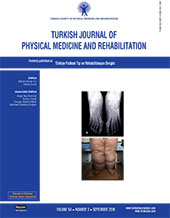Turkish version of Parkinson Fatigue Scale: Validity and reliability study of binary scoring method
2 Department of Neurology, University of Health Sciences, Dışkapı Yıldırım Beyazıt Training and Research Hospital, Ankara, Turkey DOI : 10.5606/tftrd.2018.2074 Objectives: The aim of the present study was to translate and cross-culturally adapt the Parkinson Fatigue Scale (PFS) into Turkish and to evaluate its reliability and validity.
Patients and methods: Between September 2015 and May 2016, a total of 138 patients (84 males, 54 females; mean age 62.8±9.3 years; range, 42 to 83 years) with Parkinson`s disease (PD) were included in this study. The Turkish version of the PFS was analyzed for data quality, scaling assumptions, acceptability, reliability, and validity. We used the binary scoring method of the Parkinson Fatigue Scale.
Results: The data quality for the Turkish version of the PFS was excellent. The scaling assumption was acceptable. The scale provided an acceptable internal consistency (Cronbach`s alpha was 0.955 for a test and 0.941 for a retest, and corrected item-to-total correlations were ranged from 0.478 to 0.849. The test-retest reliability (correlation coefficients were ranged from 0.650 to 0.875) was adequate. Although the total binary score of the PFS was not associated with demographic and clinical data, it was significantly correlated with some of the clinical rating scale scores, including the Unified Parkinson`s Disease Rating Scale, Schwab & England Activities of Daily Living Scale, Hospital Anxiety and Depression Scale, Epworth Sleepiness Scale, Pittsburg Sleep Quality Index, 36-item Short Form Health Survey, 39-item Parkinson`s Disease Questionnaire, and Fatigue Severity Scale.
Conclusion: The Turkish version of the PFS is an acceptable, valid, and reliable tool for the assessment of fatigue in PD patients.
Keywords : Adaptation; binary scoring method; Parkinson Fatigue Scale; reliability; validity

















